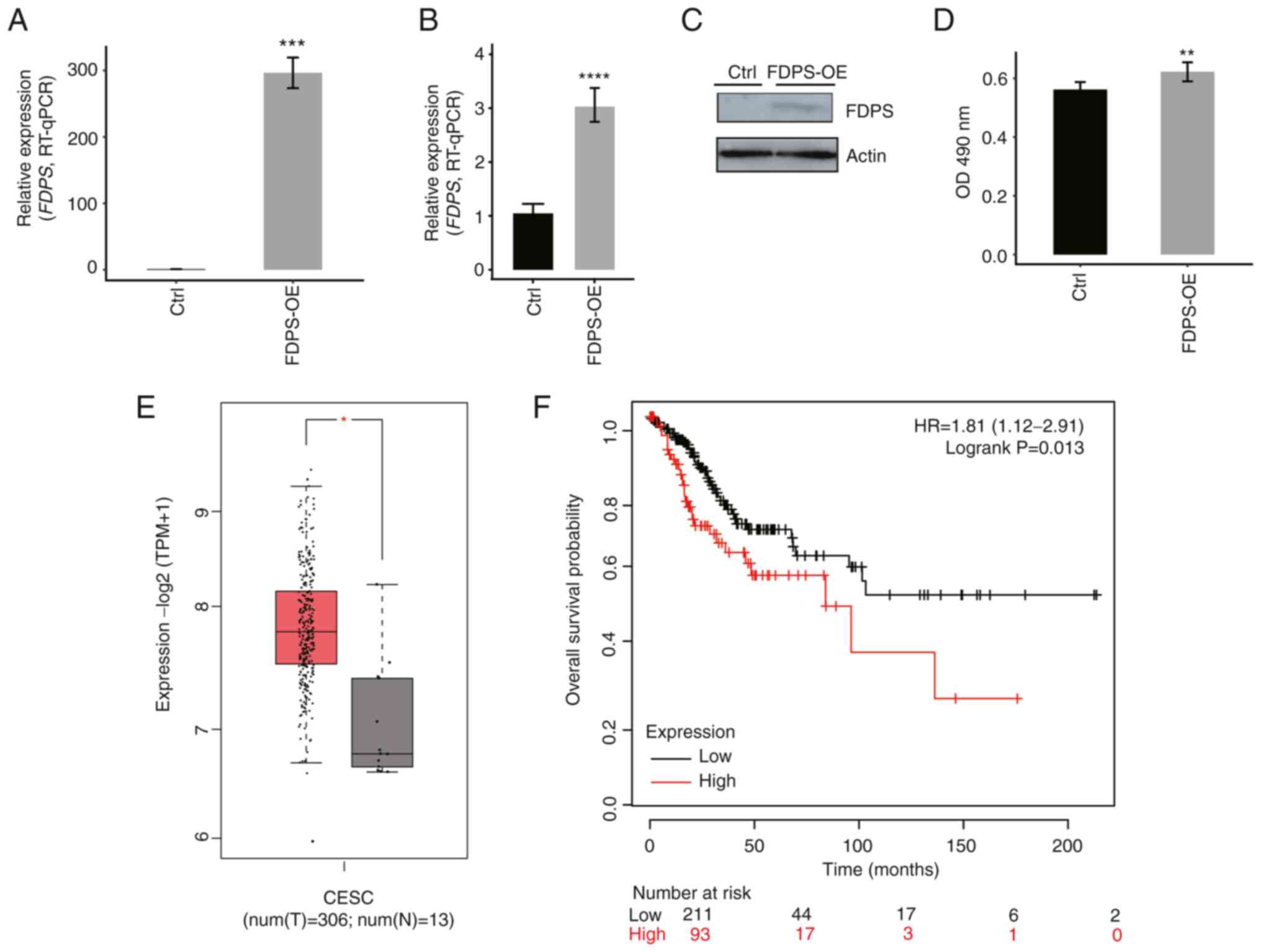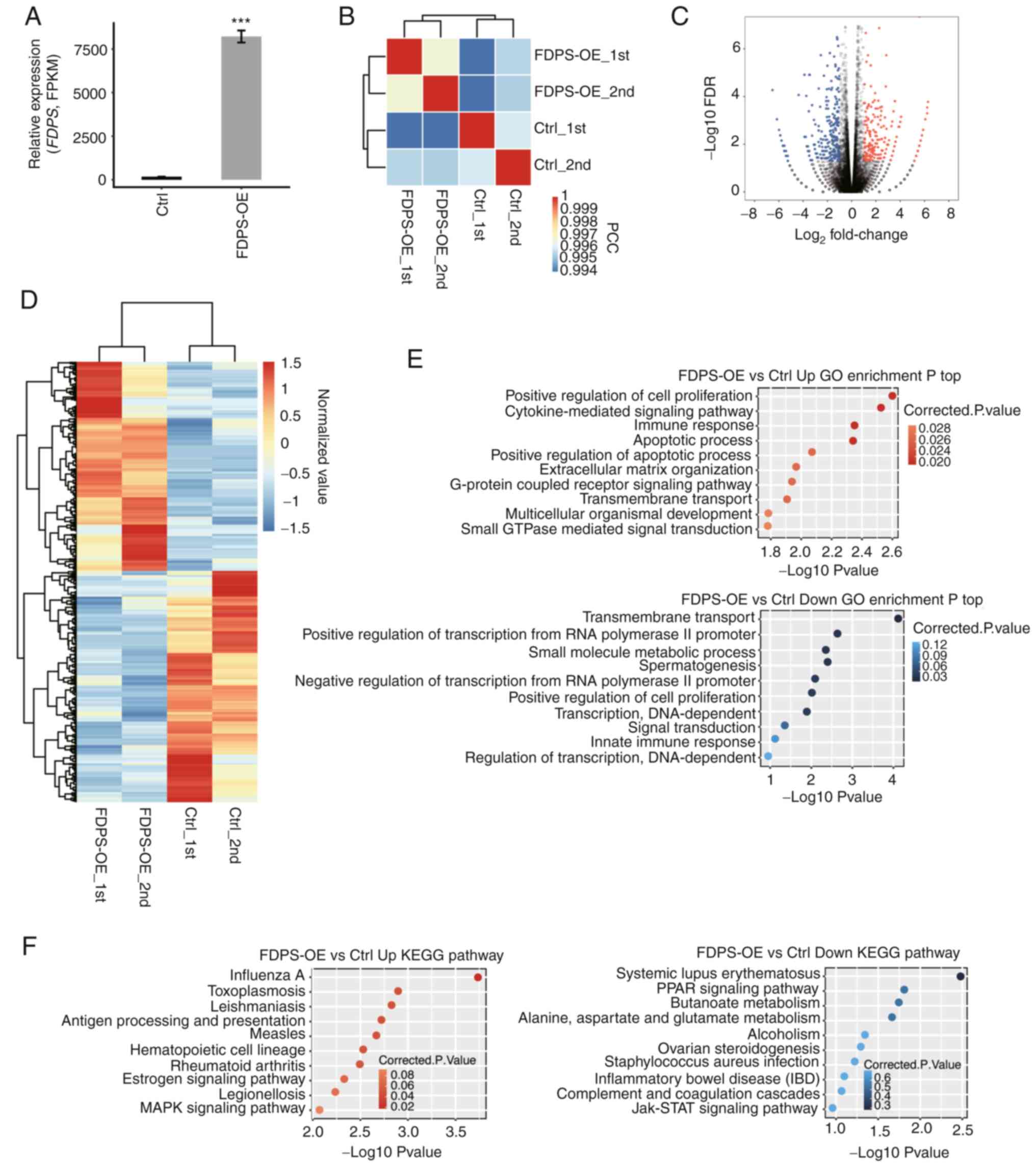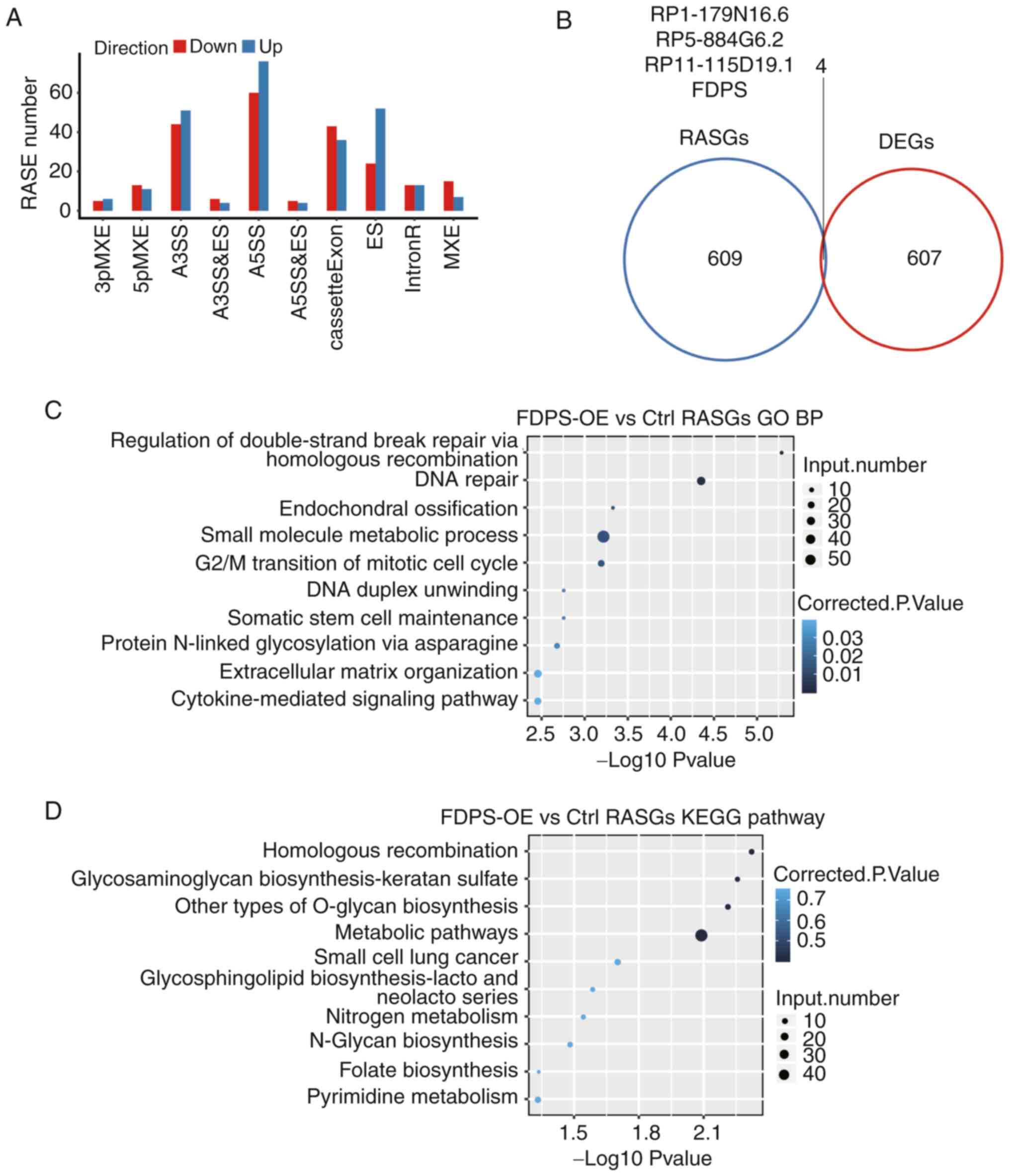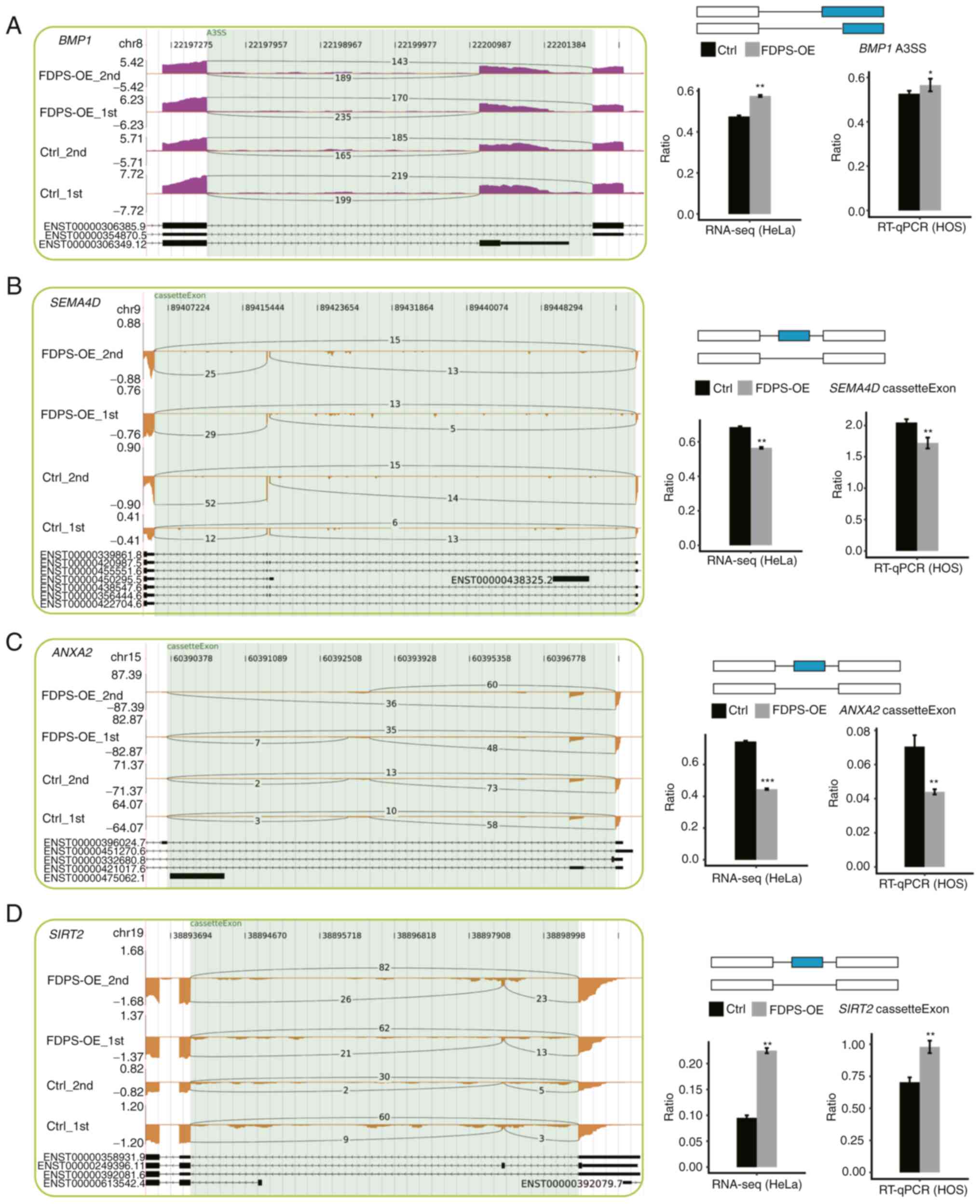|
1
|
Liang PH, Ko TP and Wang AHJ: Structure,
mechanism and function of prenyltransferases. Eur J Biochem.
269:3339–3354. 2002. View Article : Google Scholar : PubMed/NCBI
|
|
2
|
Waller DD, Park J and Tsantrizos YS:
Inhibition of farnesyl pyrophosphate (FPP) and/or geranylgeranyl
pyrophosphate (GGPP) biosynthesis and its implication in the
treatment of cancers. Crit Rev Biochem Mol Biol. 54:41–60. 2019.
View Article : Google Scholar : PubMed/NCBI
|
|
3
|
Notarnicola M, Messa C, Cavallini A,
Bifulco M, Tecce MF, Eletto D, Di Leo A, Montemurro S, Laezza C and
Caruso MG: Higher farnesyl diphosphate synthase activity in human
colorectal cancer inhibition of cellular apoptosis. Oncology.
67:351–358. 2004. View Article : Google Scholar : PubMed/NCBI
|
|
4
|
Bouterfa HL, Sattelmeyer V, Czub S,
Vordermark D, Roosen K and Tonn JC: Inhibition of Ras farnesylation
by lovastatin leads to downregulation of proliferation and
migration in primary cultured human glioblastoma cells. Anticancer
Res. 20:2761–2771. 2000.PubMed/NCBI
|
|
5
|
Woo IS, Eun SY, Kim HJ, Kang ES, Kim HJ,
Lee JH, Chang KC, Kim JH, Hong SC and Seo HG: Farnesyl diphosphate
synthase attenuates paclitaxel-induced apoptotic cell death in
human glioblastoma U87MG cells. Neurosci Lett. 474:115–120. 2010.
View Article : Google Scholar : PubMed/NCBI
|
|
6
|
Marini F, Falchetti A, Silvestri S, Bagger
Y, Luzi E, Tanini A, Christiansen C and Brandi ML: Modulatory
effect of farnesyl pyrophosphate synthase (FDPS) rs2297480
polymorphism on the response to long-term amino-bisphosphonate
treatment in postmenopausal osteoporosis. Curr Med Res Opin.
24:2609–2615. 2008. View Article : Google Scholar : PubMed/NCBI
|
|
7
|
Olmos JM, Zarrabeitia MT, Hernández JL,
Sañudo C, González-Macías J and Riancho JA: Common allelic variants
of the farnesyl diphosphate synthase gene influence the response of
osteoporotic women to bisphosphonates. Pharmacogenomics J.
12:227–232. 2012. View Article : Google Scholar : PubMed/NCBI
|
|
8
|
Ciubean AD, Ungur RA, Irsay L, Ciortea VM,
Borda IM, Dogaru GB, Trifa AP, Vesa SC and Buzoianu AD:
Polymorphisms of FDPS, LRP5, SOST and VKORC1 genes and their
relation with osteoporosis in postmenopausal Romanian women. PLoS
One. 14:e02257762019. View Article : Google Scholar : PubMed/NCBI
|
|
9
|
Wiemer A, Hohl R and Wiemer D: The
intermediate enzymes of isoprenoid metabolism as anticancer
targets. Anticancer Agents Med Chem. 9:526–542. 2009. View Article : Google Scholar : PubMed/NCBI
|
|
10
|
Dunford JE, Kwaasi AA, Rogers MJ, Barnett
BL, Ebetino FH, Russell RG, Oppermann U and Kavanagh KL:
Structure-activity relationships among the nitrogen containing
bisphosphonates in clinical use and other analogues: Time-dependent
inhibition of human farnesyl pyrophosphate synthase. J Med Chem.
51:2187–2195. 2008. View Article : Google Scholar : PubMed/NCBI
|
|
11
|
Yang J, Zhu HH, Chen GP, Ye Y, Zhao CZ,
Mou Y and Hu SJ: Inhibition of farnesyl pyrophosphate synthase
attenuates angiotensin II-induced cardiac hypertrophy and fibrosis
in vivo. Int J Biochem Cell Biol. 45:657–666. 2013. View Article : Google Scholar : PubMed/NCBI
|
|
12
|
Fontalis A and Eastell R: The challenge of
long-term adherence: The role of bone turnover markers in
monitoring bisphosphonate treatment of osteoporosis. Bone.
136:1153362020. View Article : Google Scholar : PubMed/NCBI
|
|
13
|
Kamimura M, Ikegami S, Mukaiyama K, Koiwai
H, Nakamura Y, Taguchi A and Kato H: Additive effects of
eldecalcitol in poorly responding long-term bisphosphonate
treatment for osteoporosis. Osteoporos Sarcopenia. 5:57–61. 2019.
View Article : Google Scholar : PubMed/NCBI
|
|
14
|
Kavanagh KL, Guo K, Dunford JE, Wu X,
Knapp S, Ebetino FH, Rogers MJ, Russell RG and Oppermann U: The
molecular mechanism of nitrogen-containing bisphosphonates as
antiosteoporosis drugs. Proc Natl Acad Sci USA. 103:7829–7834.
2006. View Article : Google Scholar : PubMed/NCBI
|
|
15
|
LaFleur J, DuVall SL, Willson T, Ginter T,
Patterson O, Cheng Y, Knippenberg K, Haroldsen C, Adler RA, Curtis
JR, et al: Analysis of osteoporosis treatment patterns with
bisphosphonates and outcomes among postmenopausal veterans. Bone.
78:174–185. 2015. View Article : Google Scholar : PubMed/NCBI
|
|
16
|
Coxon FP and Rogers MJ: The role of
prenylated small GTP-binding proteins in the regulation of
osteoclast function. Calcif Tissue Int. 72:80–84. 2003. View Article : Google Scholar : PubMed/NCBI
|
|
17
|
Russell RG, Watts NB, Ebetino FH and
Rogers MJ: Mechanisms of action of bisphosphonates: Similarities
and differences and their potential influence on clinical efficacy.
Osteoporos Int. 19:733–759. 2008. View Article : Google Scholar : PubMed/NCBI
|
|
18
|
Jobke B, Milovanovic P, Amling M and Busse
B: Bisphosphonate-osteoclasts: Changes in osteoclast morphology and
function induced by antiresorptive nitrogen-containing
bisphosphonate treatment in osteoporosis patients. Bone. 59:37–43.
2014. View Article : Google Scholar : PubMed/NCBI
|
|
19
|
Seshacharyulu P, Rachagani S, Muniyan S,
Siddiqui JA, Cruz E, Sharma S, Krishnan R, Killips BJ, Sheinin Y,
Lele SM, et al: FDPS cooperates with PTEN loss to promote prostate
cancer progression through modulation of small GTPases/AKT axis.
Oncogene. 38:5265–5280. 2019. View Article : Google Scholar : PubMed/NCBI
|
|
20
|
Castello A, Hentze MW and Preiss T:
Metabolic enzymes enjoying new partnerships as RNA-binding
proteins. Trends Endocrinol Metab. 26:746–757. 2015. View Article : Google Scholar : PubMed/NCBI
|
|
21
|
Castello A, Fischer B, Eichelbaum K, Horos
R, Beckmann BM, Strein C, Davey NE, Humphreys DT, Preiss T,
Steinmetz LM, et al: Insights into RNA biology from an atlas of
mammalian mRNA-binding proteins. Cell. 149:1393–1406. 2012.
View Article : Google Scholar : PubMed/NCBI
|
|
22
|
Li H, Xie S, Liu X, Wu H, Lin X, Gu J,
Wang H and Duan Y: Matrine alters microRNA expression profiles in
SGC-7901 human gastric cancer cells. Oncol Rep. 32:2118–2126. 2014.
View Article : Google Scholar : PubMed/NCBI
|
|
23
|
Abate M, Laezza C, Pisanti S, Torelli G,
Seneca V, Catapano G, Montella F, Ranieri R, Notarnicola M,
Gazzerro P, et al: Deregulated expression and activity of farnesyl
diphosphate synthase (FDPS) in glioblastoma. Sci Rep. 7:141232017.
View Article : Google Scholar : PubMed/NCBI
|
|
24
|
Chatrikhi R, Mallory MJ, Gazzara MR,
Agosto LM, Zhu WS, Litterman AJ, Ansel KM and Lynch KW: RNA binding
protein CELF2 regulates signal-induced alternative polyadenylation
by competing with enhancers of the polyadenylation machinery. Cell
Rep. 28:2795–2806.e3. 2019. View Article : Google Scholar : PubMed/NCBI
|
|
25
|
Fuller K, Owens JM, Jagger CJ, Wilson A,
Moss R and Chambers TJ: Macrophage colony-stimulating factor
stimulates survival and chemotactic behavior in isolated
osteoclasts. J Exp Med. 178:1733–1744. 1993. View Article : Google Scholar : PubMed/NCBI
|
|
26
|
Shinoda K, Suda A, Otonari K, Futaki S and
Imanishi M: Programmable RNA methylation and demethylation using
PUF RNA binding proteins. Chem Commun (Camb). 56:1365–1368. 2020.
View Article : Google Scholar : PubMed/NCBI
|
|
27
|
Fagoonee S, Picco G, Orso F, Arrigoni A,
Longo DL, Forni M, Scarfò I, Cassenti A, Piva R, Cassoni P, et al:
The RNA-binding protein ESRP1 promotes human colorectal cancer
progression. Oncotarget. 8:10007–10024. 2017. View Article : Google Scholar : PubMed/NCBI
|
|
28
|
Rauwel B, Degboé Y, Diallo K, Sayegh S,
Baron M, Boyer JF, Constantin A, Cantagrel A and Davignon JL:
Inhibition of osteoclastogenesis by the RNA-binding protein QKI5: A
novel approach to protect from bone resorption. J Bone Miner Res.
35:753–765. 2020. View Article : Google Scholar : PubMed/NCBI
|
|
29
|
Kang MH, Jeong KJ, Kim WY, Lee HJ, Gong G,
Suh N, Győrffy B, Kim S, Jeong SY, Mills GB and Park YY: Musashi
RNA-binding protein 2 regulates estrogen receptor 1 function in
breast cancer. Oncogene. 36:1745–1752. 2017. View Article : Google Scholar : PubMed/NCBI
|
|
30
|
Sherman EJ, Mitchell DC and Garner AL: The
RNA-binding protein SART3 promotes miR-34a biogenesis and G1 cell
cycle arrest in lung cancer cells. J Biol Chem. 294:17188–17196.
2019. View Article : Google Scholar : PubMed/NCBI
|
|
31
|
Wang E and Aifantis I: RNA splicing and
cancer. Trends Cancer. 6:631–644. 2020. View Article : Google Scholar : PubMed/NCBI
|
|
32
|
Chen J and Weiss WA: Alternative splicing
in cancer: Implications for biology and therapy. Oncogene. 34:1–14.
2015. View Article : Google Scholar : PubMed/NCBI
|
|
33
|
Sugiyama M, Kodama T, Konishi K, Abe K,
Asami S and Oikawa S: Compactin and simvastatin, but not
pravastatin, induce bone morphogenetic protein-2 in human
osteosarcoma cells. Biochem Biophys Res Commun. 271:688–692. 2000.
View Article : Google Scholar : PubMed/NCBI
|
|
34
|
Tu Y, Wu X, Yu F, Dang J, Wang J, Wei Y,
Cai Z, Zhou Z, Liao W, Li L and Zhang Y: Tristetraprolin
specifically regulates the expression and alternative splicing of
immune response genes in HeLa cells. BMC Immunol. 20:132019.
View Article : Google Scholar : PubMed/NCBI
|
|
35
|
Kim D, Pertea G, Trapnell C, Pimentel H,
Kelley R and Salzberg SL: TopHat2: Accurate alignment of
transcriptomes in the presence of insertions, deletions and gene
fusions. Genome Biol. 14:R362013. View Article : Google Scholar : PubMed/NCBI
|
|
36
|
Therneau T, Hart S and Kocher J:
Calculating samplesSize estimates for RNA Seq studies. R package
version 1.36.0. 2022.
|
|
37
|
Robinson MD, McCarthy DJ and Smyth GK:
edgeR: A bioconductor package for differential expression analysis
of digital gene expression data. Bioinformatics. 26:139–140. 2010.
View Article : Google Scholar : PubMed/NCBI
|
|
38
|
Xia H, Chen D, Wu Q, Wu G, Zhou Y, Zhang Y
and Zhang L: CELF1 preferentially binds to exon-intron boundary and
regulates alternative splicing in HeLa cells. Biochim Biophys Acta
Gene Regul Mech. 1860:911–921. 2017. View Article : Google Scholar : PubMed/NCBI
|
|
39
|
Livak KJ and Schmittgen TD: Analysis of
relative gene expression data using real-time quantitative PCR and
the 2(−Delta Delta C(T)) method. Methods. 25:402–408. 2001.
View Article : Google Scholar : PubMed/NCBI
|
|
40
|
Xie C, Mao X, Huang J, Ding Y, Wu J, Dong
S, Kong L, Gao G, Li CY and Wei L: KOBAS 2.0: A web server for
annotation and identification of enriched pathways and diseases.
Nucleic Acids Res. 39((Web Server Issue)): W316–W322. 2011.
View Article : Google Scholar : PubMed/NCBI
|
|
41
|
Tang Z, Kang B, Li C, Chen T and Zhang Z:
GEPIA2: An enhanced web server for large-scale expression profiling
and interactive analysis. Nucleic Acids Res. 47((W1)): W556–W560.
2019. View Article : Google Scholar : PubMed/NCBI
|
|
42
|
Nagy Á, Munkácsy G and Győrffy B:
Pancancer survival analysis of cancer hallmark genes. Sci Rep.
11:60472021. View Article : Google Scholar : PubMed/NCBI
|
|
43
|
Fujiwara T, Zhou J, Ye S and Zhao H:
RNA-binding protein Musashi2 induced by RANKL is critical for
osteoclast survival. Cell Death Dis. 7:e23002016. View Article : Google Scholar : PubMed/NCBI
|
|
44
|
Li X, Ominsky MS, Villasenor KS, Niu QT,
Asuncion FJ, Xia X, Grisanti M, Wronski TJ, Simonet WS and Ke HZ:
Sclerostin antibody reverses bone loss by increasing bone formation
and decreasing bone resorption in a rat model of male osteoporosis.
Endocrinology. 159:260–271. 2018. View Article : Google Scholar : PubMed/NCBI
|
|
45
|
Dhar MK, Koul A and Kaul S: Farnesyl
pyrophosphate synthase: A key enzyme in isoprenoid biosynthetic
pathway and potential molecular target for drug development. N
Biotechnol. 30:114–123. 2013. View Article : Google Scholar : PubMed/NCBI
|
|
46
|
Ishimoto K, Tachibana K, Hanano I,
Yamasaki D, Nakamura H, Kawai M, Urano Y, Tanaka T, Hamakubo T,
Sakai J, et al: Sterol-regulatory-element-binding protein 2 and
nuclear factor Y control human farnesyl diphosphate synthase
expression and affect cell proliferation in hepatoblastoma cells.
Biochem J. 429:347–357. 2010. View Article : Google Scholar : PubMed/NCBI
|
|
47
|
Shen H, Zhan M, Zhang Y, Huang S, Xu S,
Huang X, He M, Yao Y, Man M and Wang J: PLZF inhibits proliferation
and metastasis of gallbladder cancer by regulating IFIT2. Cell
Death Dis. 9:712018. View Article : Google Scholar : PubMed/NCBI
|
|
48
|
Chen L, Zhai W, Zheng X, Xie Q, Zhou Q,
Tao M, Zhu Y, Wu C and Jiang J: Decreased IFIT2 expression promotes
gastric cancer progression and predicts poor prognosis of the
patients. Cell Physiol Biochem. 45:15–25. 2018. View Article : Google Scholar : PubMed/NCBI
|
|
49
|
Ohsugi T, Yamaguchi K, Zhu C, Ikenoue T
and Furukawa Y: Decreased expression of interferon-induced protein
2 (IFIT2) by Wnt/β-catenin signaling confers anti-apoptotic
properties to colorectal cancer cells. Oncotarget. 8:100176–100186.
2017. View Article : Google Scholar : PubMed/NCBI
|
|
50
|
Su W, Xiao W, Chen L, Zhou Q, Zheng X, Ju
J, Jiang J and Wang Z: Decreased IFIT2 expression in human
non-small-cell lung cancer tissues is associated with cancer
progression and poor survival of the patients. Onco Targets Ther.
12:8139–8149. 2019. View Article : Google Scholar : PubMed/NCBI
|
|
51
|
Gao F, Xu F, Wu D, Cheng J and Xia P:
Identification of novel genes associated with fracture healing in
osteoporosis induced by Krm2 overexpression or Lrp5 deficiency. Mol
Med Rep. 15:3969–3976. 2017. View Article : Google Scholar : PubMed/NCBI
|
|
52
|
Paiva KB and Granjeiro JM: Bone tissue
remodeling and development: Focus on matrix metalloproteinase
functions. Arch Biochem Biophys. 561:74–87. 2014. View Article : Google Scholar : PubMed/NCBI
|
|
53
|
Mazur CM, Woo JJ, Yee CS, Fields AJ,
Acevedo C, Bailey KN, Kaya S, Fowler TW, Lotz JC, Dang A, et al:
Osteocyte dysfunction promotes osteoarthritis through
MMP13-dependent suppression of subchondral bone homeostasis. Bone
Res. 7:342019. View Article : Google Scholar : PubMed/NCBI
|
|
54
|
Jara P, Calyeca J, Romero Y, Plácido L, Yu
G, Kaminski N, Maldonado V, Cisneros J, Selman M and Pardo A:
Matrix metalloproteinase (MMP)-19-deficient fibroblasts display a
profibrotic phenotype. Am J Physiol Lung Cell Mol Physiol.
308:L511–L522. 2015. View Article : Google Scholar : PubMed/NCBI
|
|
55
|
Garg M, Braunstein G and Koeffler HP:
LAMC2 as a therapeutic target for cancers. Taylor & Francis;
pp. 979–982. 2014, PubMed/NCBI
|
|
56
|
Vuong CK, Black DL and Zheng S: The
neurogenetics of alternative splicing. Nat Rev Neurosci.
17:265–281. 2016. View Article : Google Scholar : PubMed/NCBI
|
|
57
|
Raj T, Li YI, Wong G, Humphrey J, Wang M,
Ramdhani S, Wang YC, Ng B, Gupta I, Haroutunian V, et al:
Integrative transcriptome analyses of the aging brain implicate
altered splicing in Alzheimer's disease susceptibility. Nat Genet.
50:1584–1592. 2018. View Article : Google Scholar : PubMed/NCBI
|
|
58
|
Climente-Gonzalez H, Porta-Pardo E, Godzik
A and Eyras E: The functional impact of alternative splicing in
cancer. Cell Rep. 20:2215–2226. 2017. View Article : Google Scholar : PubMed/NCBI
|
|
59
|
Fan X and Tang L: Aberrant and alternative
splicing in skeletal system disease. Gene. 528:21–26. 2013.
View Article : Google Scholar : PubMed/NCBI
|
|
60
|
Han Y, Wang D, Guo J, Xiong Q, Li P, Zhou
YA and Zhao B: A novel splicing pathogenic variant in COL1A1
causing osteogenesis imperfecta (OI) type I in a Chinese family.
Mol Genet Genomic Med. 8:e13662020. View Article : Google Scholar : PubMed/NCBI
|
|
61
|
Kimura T, Lueck JD, Harvey PJ, Pace SM,
Ikemoto N, Casarotto MG, Dirksen RT and Dulhunty AF: Alternative
splicing of RyR1 alters the efficacy of skeletal EC coupling. Cell
Calcium. 45:264–274. 2009. View Article : Google Scholar : PubMed/NCBI
|
|
62
|
Grainger DJ, Percival J, Chiano M and
Spector TD: The role of serum TGF-beta isoforms as potential
markers of osteoporosis. Osteoporos Int. 9:398–404. 1999.
View Article : Google Scholar : PubMed/NCBI
|
|
63
|
Beaudreuil J, Taboulet J, Orcel P, Graulet
AM, Denne MA, Baudoin C, Jullienne A and De Vernejoul MC:
Calcitonin receptor mRNA in mononuclear leucocytes from
postmenopausal women: Decrease during osteoporosis and link to bone
markers with specific isoform involvement. Bone. 27:161–168. 2000.
View Article : Google Scholar : PubMed/NCBI
|
|
64
|
Janckila AJ, Takahashi K, Sun SZ and Yam
LT: Tartrate-resistant acid phosphatase isoform 5b as serum marker
for osteoclastic activity. Clin Chem. 47:74–80. 2001. View Article : Google Scholar : PubMed/NCBI
|
|
65
|
Wang L, Park P, La Marca F, Than K, Rahman
S and Lin CY: Bone formation induced by BMP-2 in human osteosarcoma
cells. Int J Oncol. 43:1095–1102. 2013. View Article : Google Scholar : PubMed/NCBI
|
|
66
|
Anderson PH, Atkins GJ, Findlay DM,
Oloughlin PD, Welldon K, Vincent C and Morris HA: RNAi-mediated
silencing of CYP27B1 abolishes 1,25(OH)2D3 synthesis and reduces
osteocalcin and CYP24 mRNA expression in human osteosarcoma (HOS)
cells. J Steroid Biochem Mol Biol. 103:601–605. 2007. View Article : Google Scholar : PubMed/NCBI
|
|
67
|
Trost Z, Trebse R, Prezelj J, Komadina R,
Logar DB and Marc J: A microarray based identification of
osteoporosis-related genes in primary culture of human osteoblasts.
Bone. 46:72–80. 2010. View Article : Google Scholar : PubMed/NCBI
|
|
68
|
Jing Y, Zhou Y, Zhou F, Wang X, Tao B, Sun
L, Liu J and Zhao H: SIRT2 deficiency prevents age-related bone
loss in rats by inhibiting osteoclastogenesis. Cell Mol Biol
(Noisy-le-grand). 65:66–71. 2019. View Article : Google Scholar : PubMed/NCBI
|
|
69
|
Negishi-Koga T, Shinohara M, Komatsu N,
Bito H, Kodama T, Friedel RH and Takayanagi H: Suppression of bone
formation by osteoclastic expression of semaphorin 4D. Nat Med.
17:1473–1480. 2011. View Article : Google Scholar : PubMed/NCBI
|
|
70
|
Terpos E, Ntanasis-Stathopoulos I,
Christoulas D, Bagratuni T, Bakogeorgos M, Gavriatopoulou M,
Eleutherakis-Papaiakovou E, Kanellias N, Kastritis E and Dimopoulos
MA: Semaphorin 4D correlates with increased bone resorption,
hypercalcemia, and disease stage in newly diagnosed patients with
multiple myeloma. Blood Cancer J. 8:422018. View Article : Google Scholar : PubMed/NCBI
|
|
71
|
Asharani P, Keupp K, Semler O, Wang W, Li
Y, Thiele H, Yigit G, Pohl E, Becker J, Frommolt P, et al:
Attenuated BMP1 function compromises osteogenesis, leading to bone
fragility in humans and zebrafish. Am J Hum Genet. 90:661–674.
2012. View Article : Google Scholar : PubMed/NCBI
|
|
72
|
Martínez-Glez V, Valencia M,
Caparrós-Martín JA, Aglan M, Temtamy S, Tenorio J, Pulido V,
Lindert U, Rohrbach M, Eyre D, et al: Identification of a mutation
causing deficient BMP1/mTLD proteolytic activity in autosomal
recessive osteogenesis imperfecta. Hum Mutat. 33:343–350. 2012.
View Article : Google Scholar : PubMed/NCBI
|
|
73
|
Grgurevic L, Macek B, Mercep M, Jelic M,
Smoljanovic T, Erjavec I, Dumic-Cule I, Prgomet S, Durdevic D, Vnuk
D, et al: Bone morphogenetic protein (BMP)1-3 enhances bone repair.
Biochem Biophys Res Commun. 408:25–31. 2011. View Article : Google Scholar : PubMed/NCBI
|



















